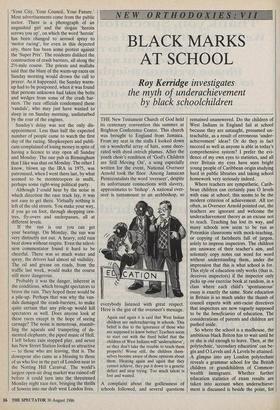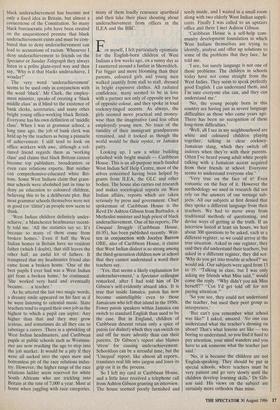NEW ORTHODOXIES: VII
BLACK MARKS AT SCHOOL
Roy Kerridge investigates
the myth of underachievement by black schoolchildren
THE New Testament Church of God held its centenary convention this summer at Brighton Conference Centre. This church was brought to England from Jamaica. From my seat in the stalls I looked down on a wonderful array of hats, some deco- rated with dyed ostrich plumes. After the youth choir's rendition of 'God's Children are Still Moving On', a song especially written for the event, National Overseer Arnold took the floor. Among Jamaican Pentecostalists the word 'overseer', despite its unfortunate connections with slavery, approximates to 'bishop'. A national over- seer is tantamount to an archbishop, so everybody listened with great respect. Here is the gist of the overseer's message.
Again and again it is said that West Indian children are underachieving in schools. This belief is due to the ignorance of those who are supposed to know better! Teachers seem to start out with the fixed belief that the children of West Indians will 'underachieve', so they don't take the trouble to teach them properly! Worse still, the children them- selves become aware of those opinions about them. Hearing again and again that they cannot achieve, they put it down to a genetic defect and stop trying. Too much talent is lost and wasted.
A complaint about the godlessness of schools followed, and several questions remained unanswered. Do the children of West Indians in England fail at school because they are untaught, presumed un- teachable, as a result of erroneous 'under- achievement' ideas? Or do they in fact succeed as well as anyone is able in today's comprehensive system? I prefer the evi- dence of my own eyes to statistics, and all over Britain my eyes have seen bright young people of Caribbean origin studying hard in public libraries and taking school homework very seriously indeed.
Where teachers are sympathetic, Carib- bean children can certainly pass 0 levels with ease at school; this seems to be the modern criterion of achievement. All too often, as Overseer Arnold pointed out, the teachers are ignorant and welcome the underachievement theory as an excuse not to. teach. Teaching has lost its way, and many schools now seem to be run as Potemkin classrooms with mock-teaching, or copying of factsheets full of jargon, solely to impress inspectors. The children are unaware of their teacher's aim, and solemnly copy notes out word for word without understanding them, under the impression that this is what school is for. This style of education only works (that is, deceives inspectors) if the inspector only picks up one exercise book at random, in a class where each child's 'spontaneous' essay is exactly the same. State education in Britain is so much under the thumb of council experts with anti-racist directives that inspectors are now vaguely supposed to be the beneficiaries of education. The considerations of parents and children are pushed aside.
So where the school is a madhouse, the ambitious black Briton has to wait until he or she is old enough to leave. Then, at the polytechnic, 'secondary education' can be- gin and 0 Levels and A Levels be attained. A glimpse into any London polytechnic reveals a grammar school for the British children or grandchildren of Common- wealth immigrants. Whether further education statistics of exam results are taken into account when underachieve- ment is discussed is beside the point, for black underachievement has become not only a fixed idea in Britain, but almost a cornerstone of the Constitution. So many black bureaucratic jobs have been created on the unquestioned premise that black underachievement exists and must be com- bated that to deny underachievement can lead to accusations of racism. Whenever I deny underachievement to friends on the Spectator or Sunday Telegraph they always listen in a polite glaze-eyed way and then say, 'Why is it that blacks underachieve, I wonder?'
The very word 'underachievement' seems to be used only in conjunction with the word 'black'. Mr Clark, the employ- ment minister, speaks of creating a 'black middle class' as if blind to the existence of bank clerks, secretaries, and many other bright young office-working black British. Everyone has his own definition of 'middle class'. When I was at grammar school, a long time ago, the job of bank clerk was held up by the teachers as being a pinnacle of achievement. I still tend to look on office workers with awe, although a col- oured friend regards them as 'working class' and claims that black Britons cannot become top publishers, broadcasters or even race relations experts. But neither can comprehensive-educated white Bri- tons. Some West Indians claim that gram- mar schools were abolished just in time to deny an education to coloured children, believing this to be a deliberate plot. But most grammar schools themselves were not as good (or 'elitist') as people now seem to think.
`West Indian children definitely under- achieve,' a Manchester headmaster recent- ly told me. 'All the statistics say so. It's because so many of them come from broken homes.' Even if half the West Indian homes in Britain have no resident father (which I doubt), that still leaves the other half, an awful lot of fathers. It transpired that my headmaster friend also came from a broken home. 'One of the best pupils I ever had was a West Indian girl from a broken home,' he continued. `She worked very hard and eventually became. . . a teacher.'
As he uttered the last two magic words, a dreamy smile appeared on his face as if he were listening to celestial music. State teachers tend to regard their own job as the highest to which a pupil can aspire. Any higher than that and they may grow jealous, and sometimes do all they can to sabotage a career. There is a sprinkling of West Indian headmasters, and Caribbean pupils at public schools such as Westmin- ster are now reaching the age to step into the job market. It would be a pity if they were all sucked into the open maw and bottomless pit of the race relations indus- try. However, the higher rungs of the race relations ladder seem reserved for white South Africans who are trickling into Britain at the rate of 7,000 a year. Most at home when juggling with race categories, many of them loudly renounce apartheid and then take their place shouting about underachievement from offices in the ILEA and the BBC.
For myself, I felt particularly optimistic for the English-born children of West Indians a few weeks ago, on a sunny day as I sauntered around a funfair in Shoreditch. Far bigger and more blooming than their parents, coloured girls and young men walked jauntily from stall to stall, dressed in bright expensive clothes. All radiated confidence, many seemed to be in love with a. partner not only of opposite sex but of opposite colour, and they spoke in loud cockney-tinged accents. As always, the girls seemed more practical and money- wise than the imaginative (and less often employed) young men. No trace of the timidity of their immigrant grandparents remained, and it looked as though the world would be their oyster, or Jamaica patty.
Looking up, I saw a white building splashed with bright murals — Caribbean House. This is an all-purpose much-funded West Indian Self Help Centre, most of the selves concerned having been helped by grants from ILEA, the GLC and other bodies. The house also carries out research and makes sociological reports on West Indian affairs, reports which are taken seriously by press and government. Chief spokesman of Caribbean House is the Revd Dr Ashton Gibson from Barbados, a Methodist minister and high priest of black underachievement. One of his reports,. The Unequal Struggle (Caribbean House, £6.95), has been published recently. Writ- ten in conjunction with Jocelyn Barrow OBE, also of Caribbean House, it claims that West Indian dialect is so strong among the third-generation children now at school that they cannot understand a word their teachers say.
`Yes, that seems a likely explanation for underachievement,' a Spectator colleague remarked, after I had told him of Dr Gibson's self-evidently absurd idea. It is true that inside Jamaica, patois has now become unintelligible even to those Jamaicans who left that island in the 1950s. Fewer patois speakers within Jamaica can switch to standard English than used to be the case. But in England, children of Caribbean descent retain only a spice of patois (or dialect) which they can switch on and off far more adroitly than can their parents. Dr Gibson's report also blames `stress' for causing underachievement. Schooldays can be a stressful time, but the `Unequal' report, like almost all reports, translates real life into jargon and loses its grip on it in the process.
So I left my card at Caribbean House, and a little later received a telephone call from Ashton Gibson granting an interview. The house seemed poorly furnished and seedy inside, and I waited in a small room along with two elderly West Indian suppli- cants. Finally I was called to an upstairs office and there I met Ashton Gibson.
`Caribbean House is a self-help com- munity development foundation in which West Indians themselves are trying to identify, analyse and offer up solutions to some of the problems that they face,' he told me.
`I see, but surely language, is not one of those problems. The children in schools today have not come straight from the West Indies. They seem to speak perfectly good English. I can understand them, and I'm sure everyone else can, and they can understand me.'
`No, the young people born in this country are having just as severe language difficulties as those who came years ago. There has .been no recognition of these long-term difficulties.'
`Well, all I see in my neighbourhood are white and coloured children playing together, talking in clear cockney- Jamaican slang, which they switch off indoors when they're with their parents. Often I've heard young adult white people talking with a Jamaican accent acquired from their friends at school. Everyone seems to understand everyone else.'
`Very true on the face of it! Even romantic on the face of it. However the methodology we used in research did not rely on the answers of our teenage sub- jects. All our subjects at first denied that they spoke a different language from their teachers. We had to move away from traditional methods of questioning, and devise ways of getting at the truth. If an interview lasted at least six hours, we had about 300 questions to be asked, each in a different register, so we could arrive at the true situation. Asked in one register, they said they did understand their teachers, but asked in a different register, they did not. `Why do you get into trouble at school?' we would ask. Our subjects were aged from 13 to 19. "Talking in class, but I was only asking my friends what Miss said," would come the reply. "Why didn't you ask Miss herself?" "Cos I'd get told off for not paying attention."
`So you see, they could not understand the teacher, but used their peer group as interpreters.'
`But can't you remember what school was like?' I asked, amazed. 'No one can understand what the teacher's droning on about! That's what lessons are like — too boring to understand, so you find it hard to pay attention, your mind wanders and you have to ask someone what the teacher just said.'
`No, it is because the children are not English-speaking. They should be put in special schools, where teachers must be very patient and go very slowly until the children develop learning skills,' Dr Gib- son said. His views on the subject are certainly more orthodox than mine.









































 Previous page
Previous page